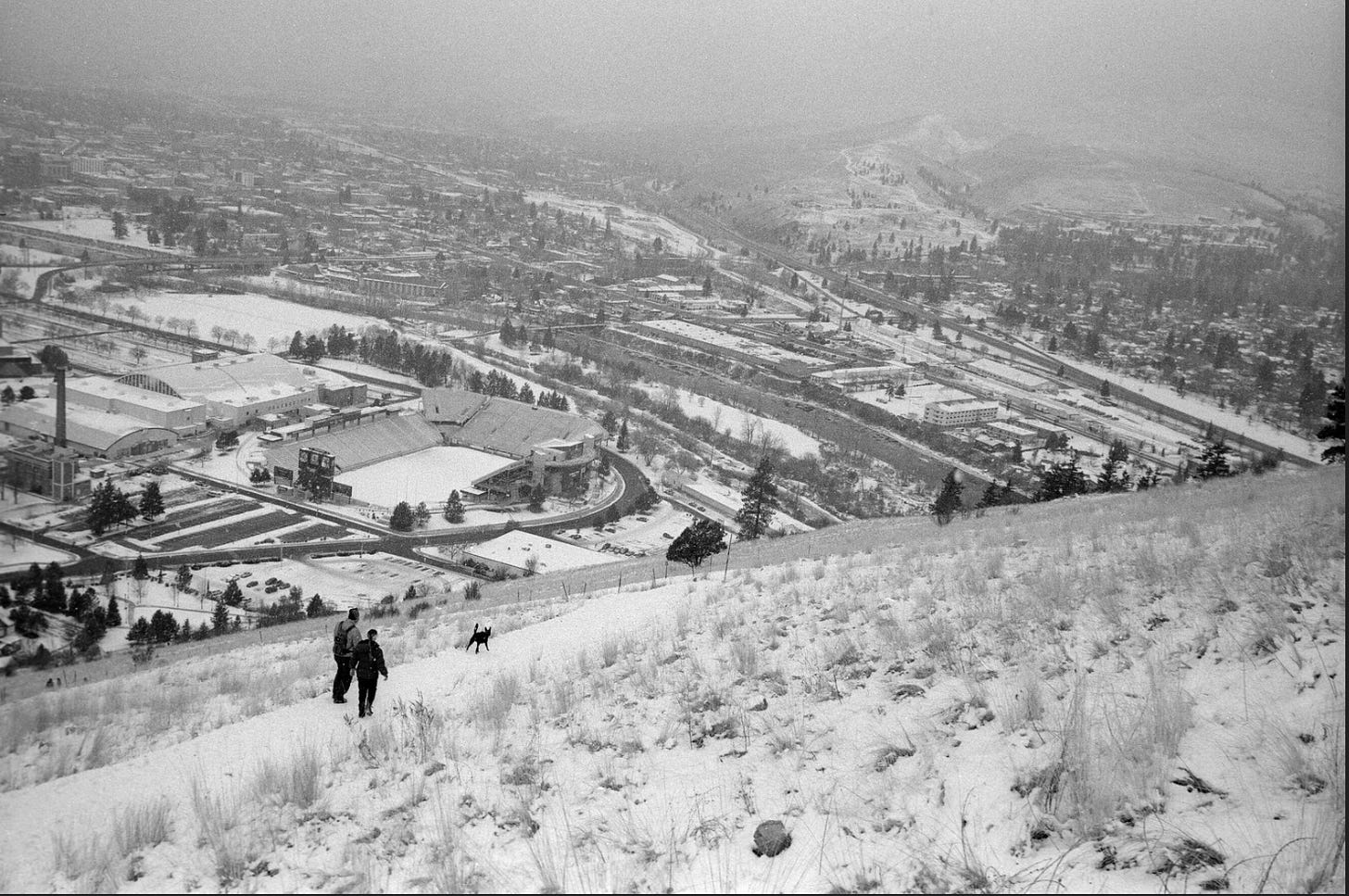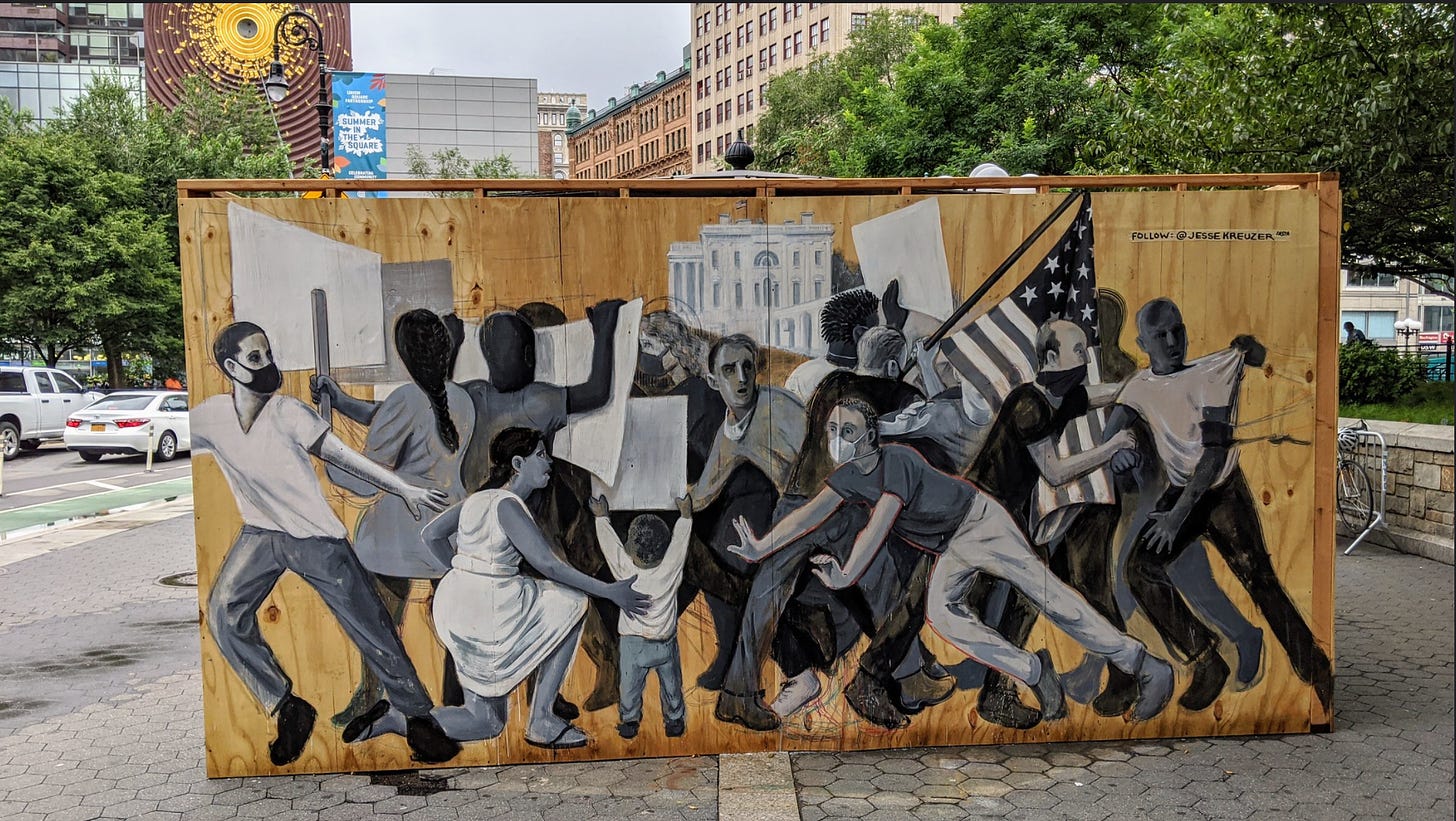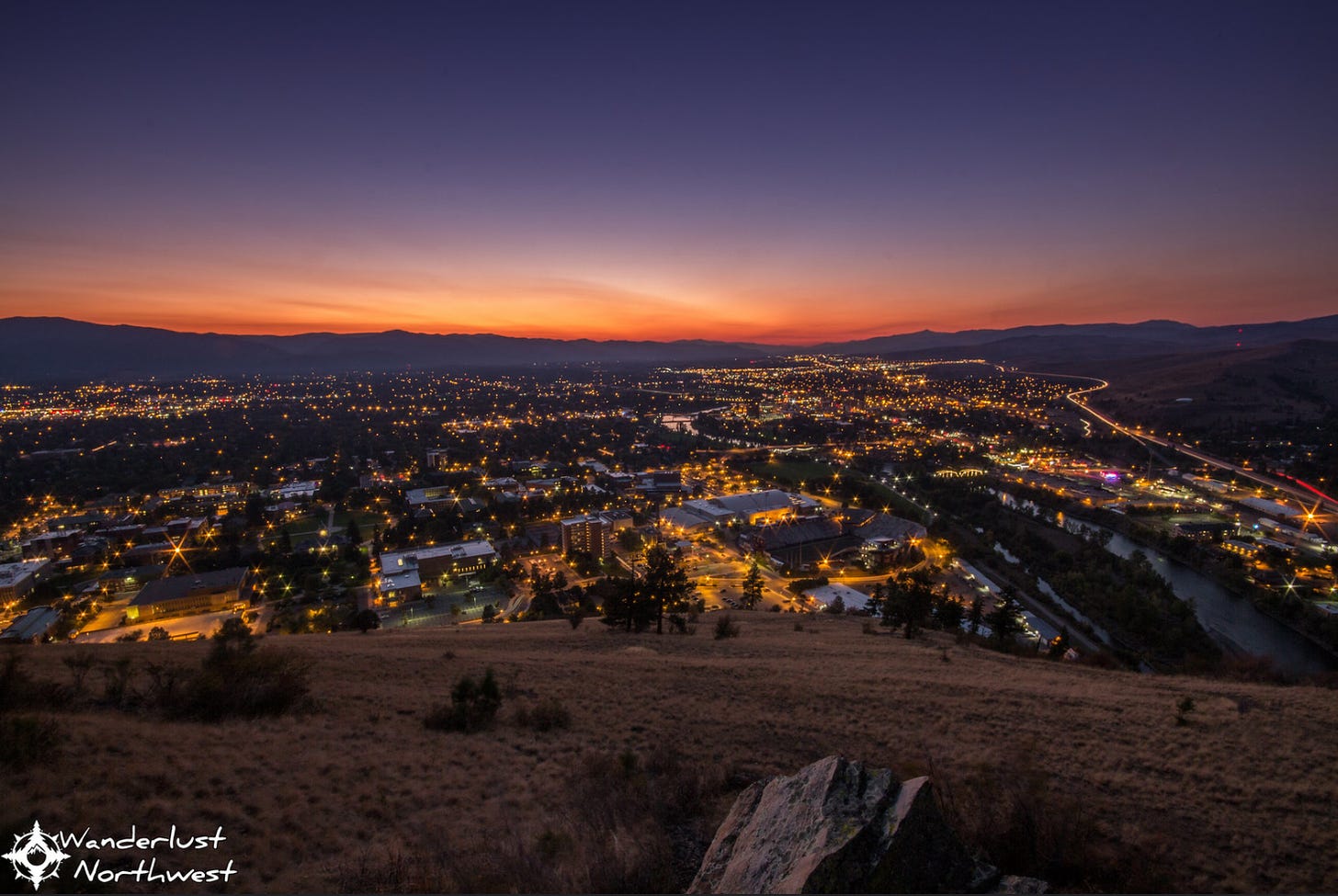2020: The Year in White People
The (somehow tentatively hopeful) year-end retrospective you definitely didn't ask for...

Note: Thank you to everybody who has already contributed to The Barnraisers Project launch. You all are amazing and I’m verklempt. Thanks in advance to anybody else who is in a position to/has an inclination to support but hasn’t done so yet (context here, if you’re curious). Every contribution has and will continue to help a ton.
I used to have a really lovely New Year’s Eve tradition. Sometime in the 11:00 hour, I’d hike up Mount Sentinel (Missoula Montana’s iconic, town-hugging gateway hill). As any Missoulian knows, “hiking up Mount Sentinel” actually means traversing a short but steep series of switchbacks until you’re at the giant concrete M a third of the way up. The goal was always to get a nice perch on the big letter before the clock struck midnight so as to afford plenty of time for year-end reflecting and year-beginning wishing/hoping before I’d get too cold and have to hike back home. There’d usually be a whole bunch of relatively fresh snow and the lights in the valley would give the whole affair an Our Town glow and the Clark Fork would be flowing placidly and there’d be a pleasant-but-not-overwhelming amount of fireworks. Real good vibes all around.
The purpose of this story is to establish my longstanding credibility as a wistful, romantic optimist (while also, I suppose, revealing that I didn’t do much partying back in high school, though in my defense I did see Tarkio play in a bike shop in ‘98 before that year’s trek up the mountain). So, take any sanguine cheerfulness below with a grain of salt. This is very much how I’m wired.
But the fact remains, I’m feeling cautiously hopeful right now. This in spite of the fact that I’m writing at the end of the No Good, Horrible, Very Bad Year, and that my particular “thing” is writing about white people, a group with a very bad track record of contributing to humanity’s flourishing.
Maybe this will all make more sense if we go through the year together. I know, I know… trust me here.

January: There were very frightening fires in Australia. Everything looked extremely apocalyptic. You’d think that alone would be enough of a wake-up call that unfettered global capitalism and the long-tail of colonial imperialism were very bad and that we would need to do something differently. Friends, that did not end up being the case. There would be more fires later. There are always more fires.
And then: The United States almost started a war with Iran. I and many others were wrong about the acute direness of that moment, but the broader point (that whenever things get dull over here we break the glass on our Orientalism alarm and start launching explosives at one or many Persian and/or Arab people) remains true.
February: Did you know that there were devastating swarms of locusts across East Africa? I didn’t until I googled “what happened in February 2020?” just now. I did remember, however, that Réne Zellweger won an Oscar that month (I don’t know for what, but I can only hope that it was a Bridget Jones sequel in which Hugh Grant and Colin Firth finally kiss). You can take all the lessons you need about the current limits of my commitment to global solidarity from those three preceding sentences.
And then: Ahmaud Arbery was hunted down and killed by a group of white guys in a truck. His death was horrific and of course, frayed so many nerves. This, in turn, would set off the year’s first but by no means last installment of well-intentioned but clumsy and not-quite-sure-where-all-this-is-going white anti-racist actions.
MarApriMay: This was, as you remember well, a single month that lasted for approximately 3000 days. It was the heady early Corona era, the halcyon days of constant panic and pseudo-competitive sourdough bread baking. Well, it wasn’t technically “early,” of course… the virus had already shut down large swaths of Asia and Europe by this point, but because no tragedy is truly real unless it happens either in the United States or Paris, I think that we can all agree that the pandemic didn’t begin until my kid’s school shut down and it affected me personally.
But here is where my underlying hopefulness starts to reveal itself. Yes, I could tell a story of the Corona months that focuses on the vocal minority of (disproportionally white) anti-lockdown-acolytes and Unmasked Big Box Store Malcontents and Michigan Gubernatorial Kidnapping Squad Members. And that story would be accurate. To be very clear— the United States was very, very bad at pandemic management. Our elected officials and institutions failed us and that vacuum of leadership did bring out the worst in so many Americans.
But it is equally notable that, for the better part of an entire calendar year, the vast majority of Americans (including the vast majority of white Americans) committed to doing a series of annoying and personally inconvenient things for the common good. We did so in spite of receiving no meaningful financial or logistical support (let alone moral leadership) from our government. We did so even under great financial duress- through the pain of lost jobs or in-person jobs that didn’t offer sufficient Covid protection. We did so even though the vast majority of helpful activities— staying home, wearing a mask, trying to plug the dykes of a broken social safety net through individual donations- offered little glory or validation or stimulation. It was all just one, long boring purgatory of collective responsibility and civically-minded repetitive hand washing. But many of us did our best.
It is not cool or smart to say “hey, it’s a good thing that millions of us tried to help each other” when it’s so much easier to focus on all the cruelties that Corona revealed about our white supremacy nation. I risk disrespecting the hundreds of thousands who have died when I remind those of us that have tried to prevent additional deaths that those efforts mattered. But still. Even halting moves towards collective concern are important, especially when there’s such a life-and-death urgency to build off of them. And when the root cause of all this is hundreds of years of white people being told that we only have to care about ourselves… then you’re damn right I’m going to overhype even minor cracks in the walls we have put up between us.
JuneJulygust The protest months!
I bet you’re predicting that if I were able to squeeze optimistic lemonade from the absolute truckload of lemons that got dumped on us in the spring, that I’m feeling particularly bullish about our Great Summer Racial Awakening. Sadly, this one’s more complicated. It is, of course, a fully and completely good thing that twenty-one million people marched for Black Lives Matter this summer. It’s great that untold many white people (including, no doubt, many folks reading this newsletter) made a legitimate and meaningful change in their beliefs/worldviews/actions as a result of the books they read or the social media accounts they followed or the movements in which they became active. I’m not complaining that there are now two fewer professional sports teams with extremely racist mascots than there were when the year began.
I am hesitating here, though, for two reasons. First, because of very real questions about how much of the summer’s Anti-Racist Gold Rush primarily unearthed a bunch of pyrite. As it turns out, while the summer did see increases in white support for Black Lives Matter, by the fall that temporary polling bump had completely disappeared. In the heat of the summer, it appeared that Minneapolis might blaze a trail for a radical rethinking of its police department. By winter, that was no longer on the table. Cops were not canceled, as it turns out. Heck, the show Cops wasn’t even canceled.
My second reason for hesitation is a persistent worry that, if the spring was marked by millions of Americans (including millions of white Americans) doing quiet, helpful things as a collective, the summer of anti-racism was where our more individualistic, competitive sides came out again. The question, too often, wasn’t “what are we building together?” but “how do I make sure that everybody sees me doing the right thing?” It was a summer of social media curation and books ordered partially for their message but partially for how they looked on our feeds. It was an age where the boundaries between “Say Her Name” and “Look At Me Saying Her Name” often felt fuzzy.
Those two concerns are related, of course. As it turns out “the things you do when everybody is watching and you’re feeling guilty” aren’t always the most sustainable.
I’m still grateful for this summer. I still think it moved us forward. I just worry that somewhere in the rush to learn How To Be Anti-Racist? that we might not have asked enough How Do We Build A Better World Together, Even If We Don’t Get Personal Credit For Doing So?
Septoctvember: Electoral politics have a unique way of funneling up all of our collective energy and attention and spitting it out in a single narrow direction. Also, by this point in the year time had long since become fully meaningless, so I honestly don’t remember these months at all. It was cool and good that the less racist Presidential candidate beat the more racist Presidential candidate. I am also glad so many people got to have dance parties because I feel like we all deserved that.
December: And now we’re here. Millions of us are having quiet holidays rather than gathering with large groups of relatives. Millions of us are trading passwords so as to watch an incomprehensibly bonkers Wonder Woman movie at home rather than going out to a theater to see it. And for every grown man lying petulantly on the floor of a Costco because he doesn’t want to wear a mask, hundreds of millions more are doing so without complaint. We are, for once, appreciating the US Postal Service and a nation of nurses and medical assistants. We are coming around to the idea that our government should take care of people’s basic needs without question or condition (eg. $2000 checks). We are, in large part, waiting patiently for a vaccine and not cutting in line. Again, these are small things. Again, it is infuriating that there are so many exceptions to each of these rules. Again, “why should white people be praised for doing the bare minimum?” etc., etc., etc. ad infinitum.
But you all. I want to live in a world where white people love shared community more than we love our own power. I want to live in a world where taking care of one another comes naturally and you apply that spirit both proactively to what folks deserve going forward and retroactively when harm from the past needs to be repaired.

All this means that, though I won’t be climbing up any mountains on New Years Eve, I will be making a wish. I’m going to wish that the lessons white people learn from 2020 will draw less than the competitive out-woke-fest of the summer months and more from the fragile, halting interconnectedness we tried to practice for three-quarters of the year. I hope we remember what it felt like to try (sometimes successfully, sometimes flailingly) to care for others. And I hope we try to do that even more in all the years that followed.
We do a lot of shaming and cajoling each other, we would-be socially conscious white people. Right now, though, I’m really grateful for you all. Thanks for making me believe that we might not just be consigned to care solely about ourselves. Thanks for trying to do better. Thanks for making me want to do better as well.
Song of the week: “A Hymn” by Idles




All of this. So wise and real and yes, dare we say it, hopeful. In addition to the individualistic performance/sincerity fine line of anti racism, there was the corporate one. Remembering McDonalds' instagram posts where they just said "Black Lives Matter" in yellow and red while employees of color protested outside of the McDonald's down the street from me because they were working in unsafe, inhumane conditions. Yuck. And I would argue November 2nd-November 7th was at least two months long :)
Thank you, Garrett. This is all very well said, and particularly important to push forward a tiny bit the stories of people actually working toward the collective good without worrying about getting credit for it. No matter how small these efforts are, they start to show others a path that they, too, can take.